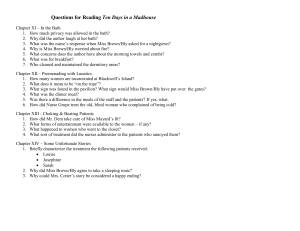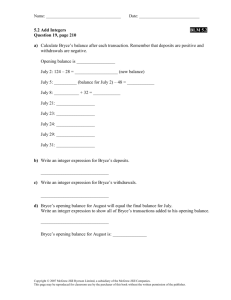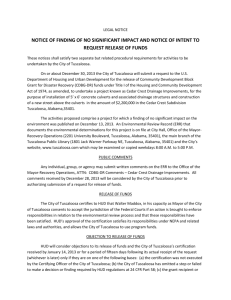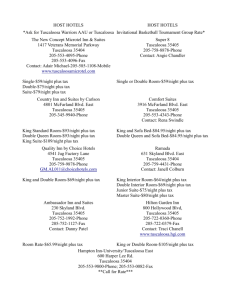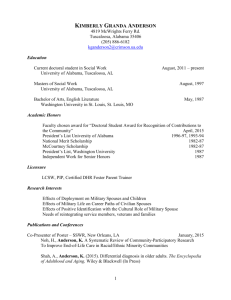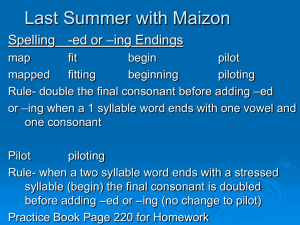Nellie_Bly_to_Dr._Peter_Bryce_Lessonquestions
advertisement
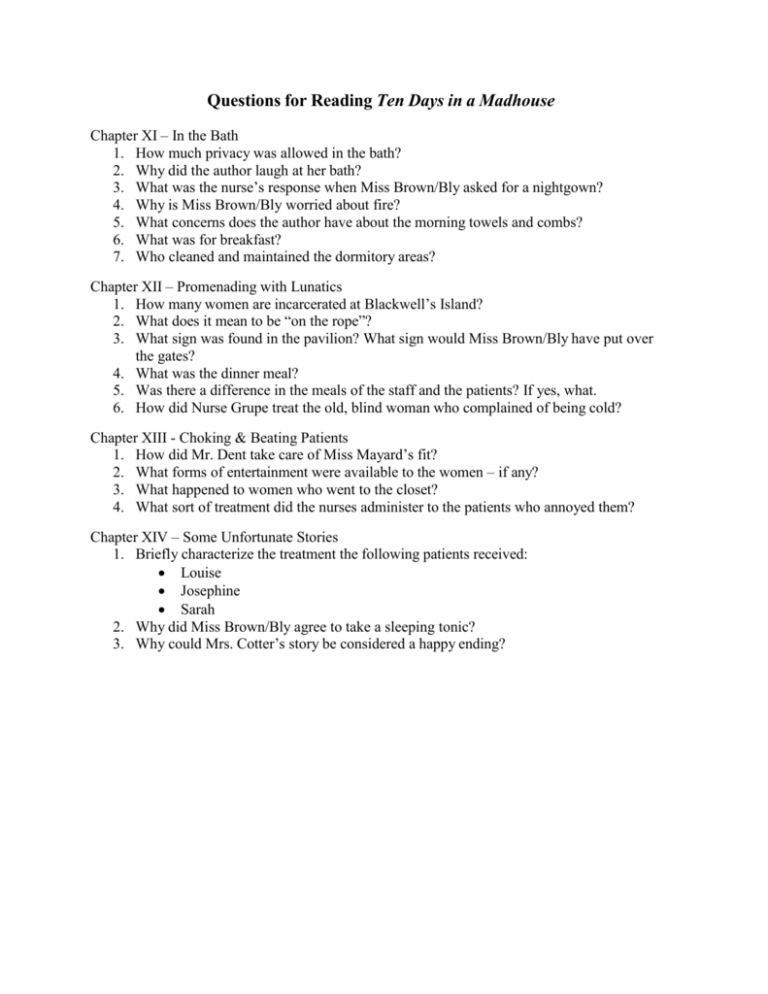
Questions for Reading Ten Days in a Madhouse Chapter XI – In the Bath 1. How much privacy was allowed in the bath? 2. Why did the author laugh at her bath? 3. What was the nurse’s response when Miss Brown/Bly asked for a nightgown? 4. Why is Miss Brown/Bly worried about fire? 5. What concerns does the author have about the morning towels and combs? 6. What was for breakfast? 7. Who cleaned and maintained the dormitory areas? Chapter XII – Promenading with Lunatics 1. How many women are incarcerated at Blackwell’s Island? 2. What does it mean to be “on the rope”? 3. What sign was found in the pavilion? What sign would Miss Brown/Bly have put over the gates? 4. What was the dinner meal? 5. Was there a difference in the meals of the staff and the patients? If yes, what. 6. How did Nurse Grupe treat the old, blind woman who complained of being cold? Chapter XIII - Choking & Beating Patients 1. How did Mr. Dent take care of Miss Mayard’s fit? 2. What forms of entertainment were available to the women – if any? 3. What happened to women who went to the closet? 4. What sort of treatment did the nurses administer to the patients who annoyed them? Chapter XIV – Some Unfortunate Stories 1. Briefly characterize the treatment the following patients received: Louise Josephine Sarah 2. Why did Miss Brown/Bly agree to take a sleeping tonic? 3. Why could Mrs. Cotter’s story be considered a happy ending? MODEL HOJ\IE FOR IN8ANE Featu res of the Alaba ma-·Bryce Hospital in Tuscaloosa. NO PHYSICAL RESTRAINT !S USED · Patients Have Concerts, Thea trtcah1, and Picnics, and Work on the FarDl. No They l\Iore ·than Vish. BIR'MINGI, Ala., Aug. Sl.-The Ala.. bama-Bryce Insane Hospital is snuated ln the town a! Tuscaloosa.. on the Queen and Crescent Road. about sixty · miles south ot Birmingham. Under the management of Dr. Peter Bryce. who d ed last year, this Alabama. State institution won a National rep• utatl·on tn the medical 'vorld. Th& - tnst1tu• tton bears the stamp of the genius of Dr.. Bryce. His idea as to the treatment of in• sano patients has become as popular as it ts successful. His theories on this subject might be well expressed in one word•• gen tleness • Dr. Bryce believed that the p-atient w ould be much better controllad ·without the straitjacket than with it. e.nd during' a. lif etime devoted to the test of this theory at the hospital that be9.rs h is nam e he f ully established its correctness. Dr. Bry has been succeeded i n th e ;nanagement ot the institution by Dr. James T. Searcey., who was his intimate associate. The hospital now owns abou t 1,200 acre ot land. wt th three or f our miles of river fron t. The proper ty embraces very fine farmlands, and bas upon It a coal seam that furnishes a very excellent quality of coal. About 500 acres of this f arm are under a high state of cultivation, most of the work being done by the less violen t pa· ttents, of whom there are between 300 and 400, who do some work ever}" day. They are not compelled to w ork. bu t are allo·9 ed to do a lmost what they please. Potatoes are the chief crop. As high a• 10,000 bushels have been prod uced ln a. single crop, the prospects no · be !n g f or a yield equally large. if not larger. The cabbage crop t his year has been ,·ery fine. besld@s which o. great many barrels ot pickles have been pu t up for home consumption. The fruit orchard out on the farm is yet too young for bea rin g. There are more than 4,000 trees of diff erent ktndspears, peaches, plums, and apples. This year 6,000 bushels ot oats were raised. and forty acres t n millet prod uced more hay than could be stored. .. good corn· crop will also be raised. The daJry, too, an interesting f eature, The hospital now ow ns abou t 100 cows, 50 of which are now in milk . These 50 cows oa Aug. 1 of th is year gave 760 pounds of mil k. being 2 gallons a day f or each cow. This milk is used most ly for coff ee and f or sick patien ts. Two hundred f ull-blooded B&k- shlre hogs are now ln very fine condition•. and will be killed ln the Fall. The watermelon crop has been very fine. and for several days the wh ole population of nearly 1,500 persons has been f ':!d just as much of this fru it as it "\\'"anted. This took from 300 to 400 melons a dav. There are now abou t 1,20 inmates con- fined ln the hospital, and 175 em ployes and their families to care for them. The entire cost of keeping up th is institu tion is less than $2 a '\veek for each pati en t. The stat- utes allow the Superintenden t to draw $3 per week f or each indigen t, but never is more than $2 drawn, and this pays the salaries of all the officers, employes, and, in. fact, all the expenses of runn ing the lnstt-- tution. Out of thi-s fund enough money ha been saved to pu t up the addition no\V ·in progress, which will accommodate about 100 more rrJ.ile patten ts. Th is bu lldlng wUl · bes ready for occupan cy by the time cold weather begins. . A great 1nany people ha ve th e idea thnt the hospital is a very noisy and dangerou place. .A. visit t h ere ·ill convi nce them that. there ls not a hotel in the cou n try whereso lit tle noise is heard. or ·h ere such goo<! order prevail s. N one of t he in n1ates is ever pu t in Iron s, or, to use th e technical' expression, mecha n ically restrained. T -:i:;; rule was adopted more tha n fif teen years agoa and it has been fou nd to work spl encidly. Humane treatmen t Instead is resorted: to, and the resu lts have been far-reaching. A great many entertain men ts are got te up for the benefit and pleasu re of t hE- convalescent and saner pat ients. 'T hese eonsist of concer ts by the bes t luca l t al nt Jn the city, amateur theatricals and tableaus, an<I bi-weekly dances tha t arc en t ered n to and· enjoyed by the pa tien ts iu a degree t ha t is high ly gratif y ing. .A.t 3.ll t h ese en tertai n- ments the very best of order preva ils ; in fact, so noticeable is t h is. t ha t ·t here are many so-called sane people '\\"h o migh t learn a lesson fru m t h e excellen t good man ners of th ese u n f ortu nates? ·ho kn ow 'hen to listen and \\·hen and w ha t to applaud. Occasion ally large nu muers of them are carried to Lake Lorai ne f ur a picnic. These are the happy tim es f or t hose peopl e, ·w hoare supposed to be ou tside t h e v orld and to have no pleasu re at all. Everyth ing t ha t can be done to n1ake- shat tered Iiv es pl eas- ant t s done. Those v ho v;ork do as u:uchi as the:y l\'ant to do and no more. \- ery of ten one may see a man roll his vheel· barrow up tu be load ed and he ·ill go galloping otr w ith it before t \VO shovelf uls of dirt are in it. Som of the pa tien ts have a lot of lif e in th em, and not a few ara very witty and well informed on many sub· j ec ts. 1 The colored pati n ts have separata apart ments. and they, too, are treated as well as can be. They have their dances•. plays, and picni cs just like the \Vhite folks. bu t they enjoy these a grea t deal mor e., There'vas a picn ic at t h e lake last Thu rsday. They had music f or dancing and refreshmen ts in prof usion, consisting of. ginger cakes, lemon ade and watermelons The hospital is not a house ot detention. or a prison, for. wh ile it is true that certal.t" restrictions are necessary, yet &verything is conducted on hu mane princ1vles. flbe- tnrUorkQtbnts Published: September 1, 1895 Copyright © The New York Times [NOTIOE :-Address all communications to Tuscaloosa, Ala.] The Alabama Insane Hospitals. INSTRUCTIONS ON BRING ING A PATIENT TO THE HOSPITAL. Let the patient, whom you bring, distinctly know where he (or she) is going. A patien t seldom forgets being deceived in that par- ticular ; and it affects nrn ny injuriously, when they hold it as a griev- unce nfterwards. It is very improper to send a lady patient in charge of an office1· alone. Always have a womnn , or a near male relative to accompany her if possible. The Proba te Judge, if he sees proper, can deputize uny relatiYe or friend to accompany a patiPnt. There need not hP any officer in charge, i n most cases. In some cases, the presence and control of a str!mgPr-an officpr of the law-acts injuriously. Fumish the pntien t wi th a sufficiency of comfortable clothing. W ith man y, to wear good clothing of their ow n , tends to their selfrespect nnd satisfaction ; and to receive articles of clothing, as well as other remembrances from home, is a matter of plen ure. Lists of clothing needed will be sen t, from ti me to ti me during the year, to the family. All persons are su pposed by the law , to be ablP to pay for their board and attendance at the Hospi t al. The Probate Judge of thP county , where the pa tien t resides, determi nes whetl:er they are not able to do so, and issues ce1·tific1ites accordingly. The regula1·chargP are twen tyfive dollars p r mon th, quarterl y i n ad vancE', which covers board and all Hospital expensPs. The pati Pn ts ure not allowed to have articles of val ue, such as jewelry, monPy, watches, etc.. on t he wards, nor articles of danger, such us knives. ma tches, scissors, etc. They ought not to b1·ing such things with them. The nnswers to the in terrogatories, on nn accompan ying sheet. ,relating to peronal 1tnd fumily history , are very important. They ought to be nrnde fully and l10n pstly , giving as m uch informaticn as possible. They are kept i n confidence, and are of great value to the physicians in making a conect opinion of the patien t. THE BRYCE HosPITAT. is thl'ee miles from the depot5 i n Tuscaloosa . The Dummy meets all trains, and hacks meet them day and n igh t. They all bring pat ien ts to the Hospi tal. Until otherwisE' instructed , bring all patients to Tuscaloosa. The trip, if possib!e, ought to be arrunged so as to reach the Hos- pital during the day. Thel'e is >lil extra charge for u hack Rt n ight, which of ten causes annoyance n nd imposition ; besides, the patien t generally comes more willingly and in better shitpe during the day , and the necessary routine of receiving u nd assign ing him is more conveniently and satisfactorily done.
